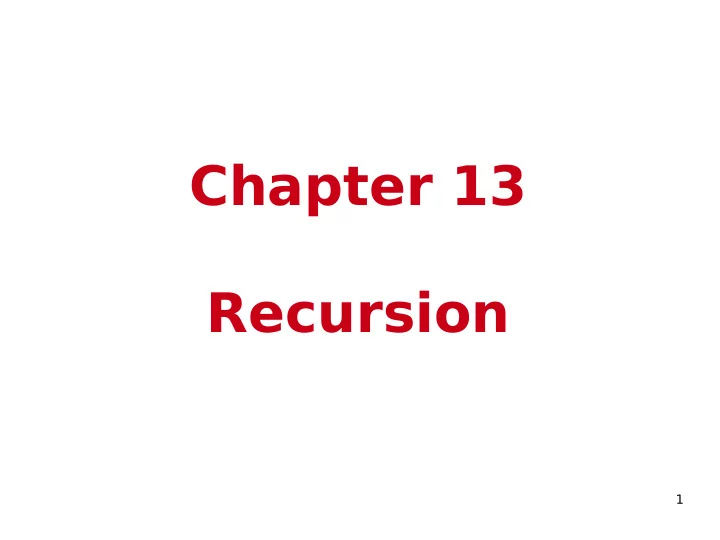

Chapter 13 Recursion 1
Recursion ● A function that "calls itself" – In function definition, call to same function ● Divide and Conquer – Basic design technique – Break large task into subtasks ● Use recursion when subtasks are smaller versions of the original task 2
Recursive Function Example ● Consider task: ● Search list for a value – Subtask 1: search 1 st half of list – Subtask 2: search 2 nd half of list ● Subtasks are smaller versions of original task! ● When this occurs, recursive function can be used. – Usually results in a more "elegant" solution 3
Recursion Example: Powers ● Function power(): result = power(2,3); – Returns 2 raised to power 3 ● Can we use recursion for this problem? – Can it be divided into subtasks which are smaller versions of the original task? 4
Function Definition for power() ● int power(int x, int n) { if (n < 0) { cout << "Illegal argument"; exit(1); } if (n == 1) return 1; return (x * power(x, n-1)); } 5
Calling Function power() ● Example: power(2,3); power(2,2)*2 power(2,1)*2 power(2,0)*2 1 – Reaches base case – Recursion stops – Values "returned back" up stack 6
Tracing Function power() 7
Recursion—A Closer Look ● Computer tracks recursive calls – Stops current function – Must know results of new recursive call before proceeding – Saves all information needed for current call ● T o be used later – Proceeds with evaluation of new recursive call – When THAT call is complete, returns to "outer" computation 8
Recursion Big Picture ● Outline of successful recursive function: – One or more cases where function accomplishes it’s task by: ● Making one or more recursive calls to solve smaller versions of original task ● Called "recursive case(s)" – One or more cases where function accomplishes it’s task without recursive calls ● Called "base case(s)" or stopping case(s) 9
Infinite Recursion ● Base case MUST eventually be entered ● If it doesn’t infinite recursion – Recursive calls never end! int power(int x, int n) { return (x * power(x, n-1)); if (n < 0) { cout << "Illegal argument"; exit(1); } if (n == 1) return 1; } 10
Stacks for Recursion ● A stack – Specialized memory structure – Like stack of paper ● Place new on top ● Remove when needed from top – Called "last-in/first-out" memory structure ● Recursion uses stacks – Each recursive call placed on stack – When one completes, last call is removed from stack 11
Stack Overflow ● Size of stack limited – Memory is finite ● Long chain of recursive calls continually adds to stack – All are added before base case causes removals ● If stack attempts to grow beyond limit: – Stack overflow error ● Infinite recursion always causes this 12
Recursion Vs Iteration ● Any task accomplished with recursion can also be done without it – Nonrecursive: called iterative, using loops ● Recursive: – Runs slower, uses more storage – Elegant solution; less coding 13
Thinking Recursively ● Ignore details – Forget how stack works – Forget the suspended computations – Yes, this is an "abstraction" principle! – And encapsulation principle! ● Let computer do "bookkeeping" – Programmer just think "big picture" 14
Recursive Design Techniques Don’t trace entire recursive sequence! • Just check 3 properties: • 1. No infinite recursion 2. Stopping cases return correct values 3. Recursive cases return correct values 15
Recursive Design Check: power() Check power() against 3 properties: • 1. No infinite recursion: • 2 nd argument decreases by 1 each call Eventually must get to base case of 1 • 2. Stopping case returns correct value: power(x,0) is base case • Returns 1, which is correct for x 0 • 3. Recursive calls correct: For n>1, power(x,n) returns power(x,n-1)*x • • From math, we know this is correct 16
Recommend
More recommend